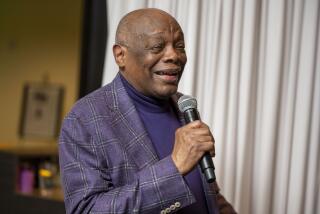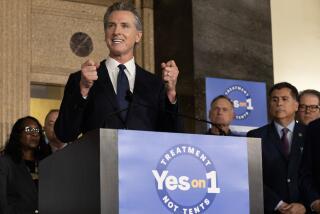Commentary / PERSPECTIVES ON THE SEMI-ANNOUNCED CANDIDATE : Who Is the Real Pete Wilson? : He Keeps His Word--if He Gives It
WILLIE BROWN is Speaker emeritus of the California Assembly. He was interviewed by Times political columnist George Skelton.
*
At the outset, you ought to know that I consider Pete Wilson a friend. He is a quality public servant. He is far more personable and a lot swifter than his public image projects. In public, he’s extraordinarily cautious about what he says and what he does. But in private, whether in a social setting or negotiating, he’s pretty adamant and fairly quick in his response.
He’s very pleasant. He can be fun. He’s interesting to talk to because he is really opinionated. He’s interested in movies, the theater, sports, politics generally, business issues. You can discuss books with him, you can discuss records, you can bring him up on what kids are doing on the streets and in college.
He’s a real tough negotiator. If he gives his word, he keeps it. The problem is, he’s very hesitant to give his word. You talk to him, he’ll listen and he’ll say, “All right, let me see.” Well, that’s not a commitment. But if he says, “That’s what we’ll do,” it’s really done.
He’s very knowledgeable. He’s always well prepared. He listens and pays proper respect to other people’s views and is not stubborn on most issues.
He does have some bottom lines beyond which he does not want to go, many times motivated by politics more than anything else. We reach accord when the politics dictate that’s the appropriate thing to do. There is example after example of this: When politics and public policy converge, Pete Wilson jumps and moves.
In 1991, it was clear that there would never be a solution to a $14.5-billion budget deficit without giving serious consideration to a tax increase. And he negotiated honorably and without reference to what the right wing might think. He thought it was more important to solve the problem than to just have a confrontation.
In 1992, he made the mistake of wanting a confrontation to prove that he was a partisan, conservative Republican. He had been beaten up by the right-wingers over the tax increase. For 64 days, he had a confrontation on the budget, and he knows that was his worst hour.
I’m now seeing Wilson make errors. In the past, he has been relatively error-free in terms of his conduct. In this business of championing the cause of getting rid of illegal immigrants, not to have revealed early on his own case was a mistake. The hiring of the maid wasn’t illegal. His problem was failing to pay her Social Security taxes. Those angry white males get pissed off with anybody in public office who doesn’t pay taxes. That’s a no-no.
As President, he would be relatively noncombative with Congress. He is noncombative with us. He just sends stuff up and he seldom gets into a contest with us. He’s not a risk-taker. He will introduce tort reform, but he will not risk any political capital pursuing it. He’s totally absent now, but this is not different from last year and the year before that. He only engages after the May revise of budget numbers. I have on many occasions just started the budget negotiations myself.
I think he would hold his own as President. His down side is that, philosophically, he comes from the wrong space and the wrong place. He is a Republican. He’s not expansive. Diversity doesn’t mean a whole lot to him.
His down side is that . . . he comes from the wrong space and the wrong place. . . . He’s not expansive. Diversity doesn’t mean a whole lot to him.
The Line on Wilson
The Times sought comment on Gov. Pete Wilson’s 1996 presidential ambitions from several political figures who have had a relationship--personal or professional, friend or foe--with Wilson over the years.
More to Read
Get the L.A. Times Politics newsletter
Deeply reported insights into legislation, politics and policy from Sacramento, Washington and beyond. In your inbox three times per week.
You may occasionally receive promotional content from the Los Angeles Times.










